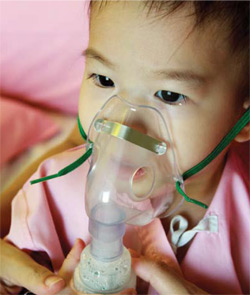Asthma, as with most other diseases, has its fair share of myths and rumours surrounding it. Some people believe that asthma is something you can “grow out” of, while others believe that asthma is contagious, or that eating certain foods can cause asthma to worsen or perhaps even get better. Just because your child suffers from asthma, it does not mean you have to put his life on hold. Proper management and understanding of the condition can help your child live a happy and fulfilling life.
Myth 1
Asthma is not that serious and deaths from asthma are rare.
Asthma can indeed be fatal; according to the World Health Organisation (WHO), annual worldwide deaths from asthma is estimated to be at 250,000. One-third of all children who die from asthma were diagnosed with only a mild form of the disease. One of the ways of identifying if a patient is at a higher risk of death is when he or she is taking a lot of puffs from their reliever inhaler daily, even requiring two or more inhalers a month.
Myth 2
Children who have asthma eventually grow out of it.
Around 50% of children suffering from asthma show improvement in symptoms, which include tightness of chest, breathlessness, coughing and wheezing, as they grow older. In some children, these symptoms may even completely disappear, though others with severe or persistent asthma often remain the same, even as adults. However, even when symptoms disappear completely, they may return later on in life, especially if they smoke, acquire infections, or in some people, when they exercise.
Myth 3
You can cure asthma.
Many parents around the world have turned to alternative or complementary treatments like homeopathy, yoga, ayurveda, herbal therapy and even acupuncture in an attempt to cure asthma. These treatments only provide short-term relief and there is no research or evidence that proves their efficacy. The best medication remains your inhalation treatment, which enables total control of your asthma. Although you may not suffer from a lot of asthma symptoms, it does not mean that your asthma has gone away. Once you have asthma, you will always have asthma.
Myth 4
Eliminating wheat and milk from the diet helps asthma.
Eating certain foods does not cause asthma, though it is possible that asthmatics may develop food allergies at some point of their lives. Eliminating foods like wheat, milk and eggs only help if your child suffers allergies when eating those foods. Asthmatics sometimes wheeze after drinking cold drinks, like cold milk, because they inhale the cool, dry air while it is being drunk. Cold, dry air can irritate hypersensitive lungs, causing the muscles around the bronchial tubes to constrict, becoming even narrower, and results in wheezing, coughing or breathing difficulties.
Myth 5
You cannot play sports or exercise if you suffer from asthma.
As long as your child is taking his medication regularly, there is no reason for him not to play sports and other outdoor games. Playing games in conditions that are dry and cold may aggravate asthma in some children, causing wheezing or breathlessness to occur. Some sports have been found to be good for asthmatics, such as swimming and sprinting. Sprinting does not involve continuous running, allowing your child to take breaks in between.
Myth 6
Exposure to animals and dust will desensitise you to them.
There are many different triggers for asthma attacks, among them animal dander and dust. Ongoing exposure causes symptoms like wheezing, coughing and shortness of breath to worsen, instead of desensitising your child to them. Restricting pets from entering bedrooms and other common areas, consistent bathing of the animal, as well as frequent vacuuming of the carpets and cleaning of the furniture can help in relieving these symptoms.
Help your child control his asthma
Having asthma does not mean your child cannot enjoy his life like every other normal kid. Through proper management and control, your child can still do the things that he/she enjoys, such as playing football or badminton.
- Take controller medication regularly, even if there are no symptoms and your child is feeling well. Keep reliever medication handy.
- Identify your child’s triggers and try to avoid exposure to them.
- Practise cleanliness – wash bedding regularly, clean furniture and carpets frequently.
- Follow your child’s treatment schedule accordingly to avoid asthma flares; it can help to save lives.
Most deaths from asthma are preventable and can easily be avoided with proper control. It is a chronic, life-long disease that should not be neglected even when there are no symptoms, or if your child is feeling well. Understand asthma as a whole, learn your child’s triggers, and always consult the doctor before making any changes to a treatment plan.







Komen